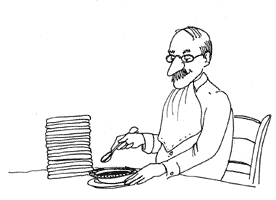>> Back to The HooK front page
STRANGE BUT TRUE- Number nuts: 'Arithmomaniacs' live to count
Published February 10, 2005 in issue 0406 of the Hook
By BILL SONES AND RICH SONES, PH.D.

DRAWING BY DEBORAH DERR McCLINTOCK
BY BILL SONES AND RICH SONES, PH.D.
Q. People who can't stop checking to see if doors are locked, or wash their hands repeatedly, or won't step on sidewalk cracks suffer from obsessive-compulsive disorder (OCD). What about someone who demands precisely 18 clean towels every day? --J. Nicholson
A. The great scientist and "arithmomaniac" Nikola Tesla did just that, saying that 18 is a multiple of 3, reports Clifford A. Pickover in Wonders of Numbers: Adventures in Mathematics, Mind, and Meaning. Also, he often felt compelled to walk around the block three times, would stay in room 207 (3 x 69) at the hotel, and kept a stack of 18 napkins nearby when dining.
Many others are similarly afflicted with this form of OCD: Case 1. A 13-year-old girl must knock three times on a window before entering; Case 2. A teen suddenly starts repeating "6, 6, 6, 6" or "8, 8, 8, 8," reporting, "I have no control over these numbers. They have a mind of their own--my mind." Another boy must turn around exactly eight times to calm himself, a seven-year-old girl must count to 50 in between reading or writing each word.
Evidence is mounting, says Pickover, that OCD runs in families, that the cause is physical (medicines help) and correlates with movement disorders such as facial tics.
Q. Do you have any idea what a "ghost word" is? Clue: "Dord" is a classic example. --N. Webster
A. It's a word that never existed in real life but nevertheless turns up in a dictionary, says David Crystal in The Cambridge Encyclopedia of the English Language. Errors by lexicographers in typing, copying, programming, or filing are the cause.
"Dord," for example, got listed as a word in Webster's (1934) when office workers took an abbreviation file labeled "D or d" for density and mistakenly created the word "Dord" as a synonym for density.
The new word stuck, appearing in other dictionaries as well. Fictitious forms are certainly not rare. Is there such a word as "antiparliamentarianism"? The Oxford English Dictionary cites only "antiparliamentarian." Medical terms are especially susceptible: Someone with serious pronunciation difficulties might be described as manifesting "an articulation disorder," "articulatory handicap," "misarticulation," or a dozen others.
"Dictionaries of speech pathology don't agree on the term," says Crystal, "and there's no guarantee that the terms a dictionary selects are the most commonly used ones-- or indeed, whether there is anyone out there using them at all."
Q. How many ordinary, home-style shuffles does it take to mix a 52-card deck? How many perfect shuffles to do it? --Doc Holliday
A. Seven ordinarily will suffice-- and beyond this you get little gain-- but most people shuffle only three or four times, leaving many of the cards in their original sequence, says Sharon Bertsch McGrayne in 365 Surprising Scientific Facts, Breakthroughs and Discoveries.
"Magicians and card cheats use this fact to improve their odds of winning," she says. For two decks, it takes nine shuffles, for six decks 12 shuffles. And you can't assume that half the number of shuffles will mix the cards about half as well: Shuffling is not linear: Much of the mixing occurs in the last few shuffles.
Will perfect shuffles do the job faster? No, randomization is the goal of shuffling. A perfect shuffle involves cutting the deck in half, then perfectly interlacing the two halves, with one card coming from one hand, then one from the other hand, then one from the first hand, says JimLoy.Com. But this sort of shuffle (in-shuffles and out-shuffles differ) retains much of the deck's sequencing.
"It has been shown that eight perfect out-shuffles return the 52-card deck to its original order... So perfect shuffles do not randomize a deck, far from it."
Ergo, the sloppier the shuffle, the fairer for the players, so long as the shuffler keeps at it for a while.
Send Strange questions to brothers Bill and Rich at .
#
>> Back to The HooK front page
|